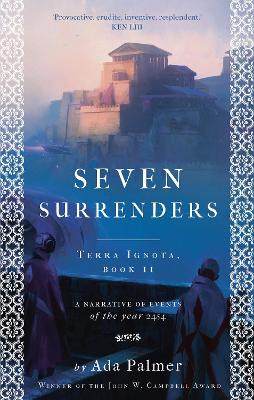Apologies in advance if this review is nonsensical. It’s for those who have read Ada Palmer, who understand tongue-tied and giddy, too much to translate at once.
Spoilers to follow, of course.
This book took a month of my life, and maybe only four days of reading; I gulped half the book each time. In between, though, it took essays and histories, detours to frame the context, turning over old stones, the Rinascimento, the Enlightenment, the Greeks, the Roman Empire, Cicero, Dante, Montaigne, Sade. That isn’t required, of course. It was all self-inflicted. It was all worth it, too, a thousand percent. I fell on it, half-starved. Someone, finally, finally, glutted with these ideas, is playing out the experiment, attempting afresh to find out where it leads.
Not just the humanitarians like the Patriarch and the romantics like Jean-Jacques, but the underbelly, La Mettrie, Diderot, de Sade. The Enlightenment tried to remake society in Reason’s image: rational laws, rational religion; but the ones who really thought it through realized morality itself was just as artificial as the aristocracies and theocracies they were sweeping away.
The first book was a stunner; this book topped it completely. In the first, I guessed at what Mycroft’s crimes meant— the horrors of war writ personal— and also at what Madame was up to. I was right on both counts, and still wrong, wrong, wrong, because the depth, breadth, and lengths to which Palmer plays out these ideas goes beyond what I could imagine. The world-building is immense, and yet the story is intimate. Keenly personal. It’s all the stories, universal in its specificity, the way they’ve played out through history, time and again, over and over.
It’s the thought experiment of all time. Take three millennia of ideas, history and myth, fact and fiction, pile it all together, ignite the fuse. Petty conflicts, world wars; religion, philosophy; heroes, saints, witches, priests, censors, madmen, kings, whores, saviors, lovers, traitors, a Christ-child, two Christ-childs, their imperfect protectors, the idealistic, the corrupt, the laws, the empires, modern, ancient, future, everybody, everything, all at once. Palmer is a historian. She knows the tipping points, the mass complexity. Only a historian could write this book, someone who spends their days plucking at the threads and asking ‘what if?’ and ‘why this?’ and ‘what then?’ With the joy, I might add, of a kid playing with all her toys at once.
“When you were a kid, did you never have the urge to build an atom bomb, just to prove with your own hands that people could?”
I’m already doing the book a disservice because I’m leaving out other massively cool things it does, but to describe it in full would take the length of the book. The sheer density of ideas, many tossed off as asides, is boggling. And by that I mean, humbling. Boggling, humbling. That’s the achievement you want.
I thought, after Mycroft’s trial early on, “I don’t know if this book could get better.” And then the ‘Rose-Tinted Daydream’ happened, and then ‘Deo Erexit Deus’ happened, and then Caesar and Mycroft at Apollo’s tomb; I thought the same thing each time. Can this book get better? And then the last three chapters happened. ‘I Was Wrong,’ ‘Hero,’ and ‘Last Prayer’— I’ve read them three times already because I want to absorb them into my cells, imprint them on my skull, think and think and think about them. I yelped out loud when: DIOGENES. (YES, she went there.) I yelped again when: Achilles. As I may have mentioned, I spent the last chapters pumping my fist in the air. After which I lay there til all hours of the night, thinking, thinking, thinking.
Caesar demands of Madame in that antepenultimate chapter: “You’re obsessed with the Eighteenth Century, have you never looked at what came later?” Golden Ages end with dark ones. What if? Why this? What then? What happens when it’s Achilles instead of Bridger? What happens you try to raise a Montaigne and get a Jehovah instead? What about when Diderot was right, but Hobbes was right, but Diogenes was right, but God was right? Which God? Why Them? What happens when Alexander has Aristotle, when Achilles has Patroclus, when Jehovah has Mycroft? When tyrants are extinct, but peace begats war just the same? When miracles have proof, when faith has reason, when reason fails?
The Great Experiment continues. As for our author, there’s this part at the end of her Machiavelli essays I keep thinking about. She hypothesizes hosting her guest of honor, saying: and we would stay up all night, and eat all the cheese and olives, and drink all the wine, and Voltaire would come, and Hobbes, and Locke, and Rochester and Rousseau would get plastered and piss themselves, and Diderot would help me mop it up while we talked about Leibnitz and the imperfection of Creation, and Machiavelli would keep pace with us even though most of the ideas in question would be two hundred years younger than him.
I can’t help but think this is what she’s done with this book. These are her co-authors. The conversation continues. They planted the seeds and, centuries later, this book was born.
I feel lucky to have it. I feel like Mycroft, inadequate. If it takes me years to unpack it, I welcome the challenge. It’s one of those books of a lifetime. And there’s still more to come.
“What I gave them was a fraction of what they planned to give the world.”
